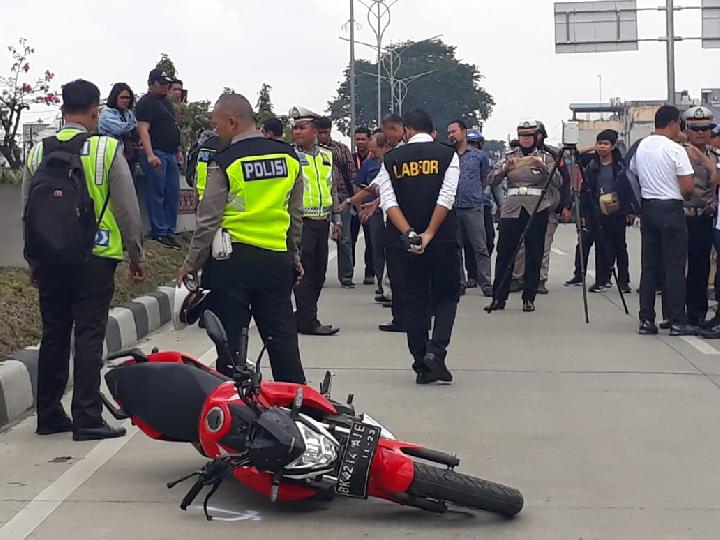Emergency of Protection for Environmental Human Rights Defenders
Translator
Editor
22 October 2019 15:14 WIB

TEMPO.CO, Jakarta - The deceased Golfrid Siregar was a human rights defender in North Sumatra who fought for the right to a good and healthy environment. Civil society mourns as he took his last breath on 6th October 2019 in Haji Adam Malik Central General Hospital, Medan. His death posed a great prejudice whether it’s due to killing.
Wahana Lingkungan Hidup Indonesia (Walhi) North Sumatra stated that Golfrid’s death left many oddities and seemed to be out of place. Although the statement of Roy Lumbangaol, a former colleague of Golfrid in the said organization, stated that the police declared his death was due to a road accident. When found, Golfrid experienced a serious injury on his head which caused his skull destroyed and the disappearance of his belongings such as bag, laptop, wallet, and ring. However, his motorcycle remained with minimal damage.
The violence against Golfrid added to a long list of violence cases conducted against human rights defenders in Indonesia, especially in the environmental sector. The use of violence often conducted by government or enterprises which revolves around the conflict of the natural resources that is advocated by human rights defenders.
The violence manifested in various forms, starting from criminalization, intimidation, terror, abduction, killing threat, and killing. Violence almost always occurs because of the power and relational gap between the people who are fighting for their rights and the oligarch. It became a way to stop the resistance.
We still remember the case of Salim Kancil, a farmer who advocated against sand mining at Lumajang, East Java. He was inhumanely killed by 30-40 people in open space. Furthermore, the case of Poro Duka still left a big scar. Poro was a citizen of West Sumba who was shot because he defended the coastal areas from tourism investment. The shooting happened while land measurement was conducted by the corporate, guarded by hundreds of police and armed soldier.
The government is fully responsible for the violence and deaths of human rights defenders. Police are sluggish and slow in responding to report of intimidation and threats, instead, they are often the perpetrator of violence. Another problem is the bad governance in the village level, district up to the province, as well as the omission of the state in not providing protection for human rights defenders.
Solving the case of Golfrid Siregar and hundreds of other human rights defenders is a must and responsibility of the state, as well as legal enforcement, be it with or without the pressure from civil society. Up until now, the government failed in solving the problem of violence conducted against human rights defenders because they do not understand the root of the problem.
Structural conflicts are often seen as a regular conflict. Subsequently, prevention measures are not established and the case handling becomes superficial. Moreover, the government is often found being hand in hand with enterprises in getting rid of human rights defenders.
In handling cases of violence against human rights defenders, the police have to be able to put forth a holistic approach, meaning that they take into consideration the political and social context that might be the motive of the violence. Prosecutors and judges have to understand the context of criminalization which systematically negates the struggle and advocacy of the people whose rights are violated.
In the long run, there are three solutions that can be taken by the government. First, Ministerial Regulation of Ministry of Environment and Forestry on Legal Protection for Environmental Defender which was initiated by civil society has to be issued. This regulation is hoped to protect human rights defender, especially in the environmental sector. This regulation has to regulate prevention mechanisms, protection handling, emergency response, coordination mechanism between responsible institutions, and the allotment of the fund provided by the state.
Second, regulating protection for human rights defenders in general within national regulation, such as in Law 39/1999 on Human Rights. United Nations Declaration on Human Rights Defenders stated that everyone has the right, individually and in association with others, to promote and to strive for the protection and realization of human rights and fundamental freedoms at the national and international levels. This Declaration also stipulated that the state is responsible and has the duty to protect, promote and fulfill human rights.
Third, the change of legal system in protecting, respecting and fulfilling human rights. Lawrence Meir Friedman’s theory elaborated three elements, namely substance, structure, and culture. The law substance is regarding whether a law can be implemented in the society while adhering to the dynamic condition of the current needs of society, as well as taking living law into account. Law structure is about the legal enforcement institutions that are well-functioned, credible, competent and have integrity. Whilst law culture is regarding the process in ameliorating society’s awareness of the law and human rights which are the indicators of the functionality of the law.
Julio Achmadi, Staff of Kemitraan bagi Pembaruan Tata Pemerintahan (Partnership for Governance Reform)























